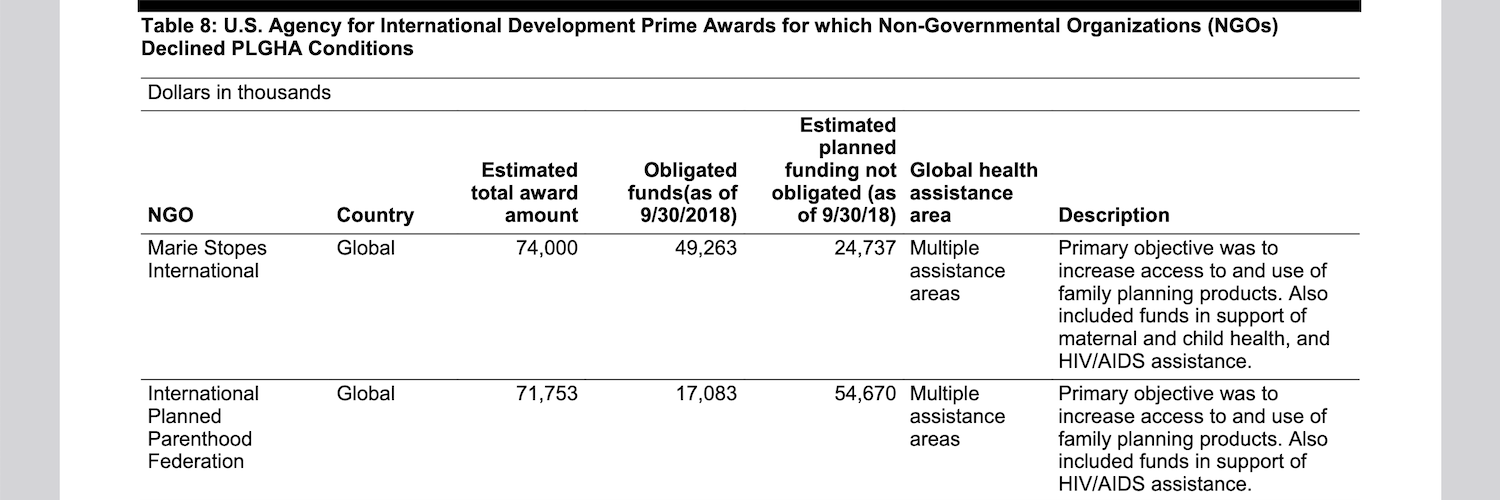Analysis: International abortion groups will fail women given the choice

Organizations declining USAID funding due to abortion restrictions. Source: Congressional Research Service
WASHINGTON, D.C. January 5, 2024 (C-Fam) Abortion groups often argue that abortion restrictions, such as the Mexico City Policy, disrupt family planning and other health services. This argument is repeated by mainstream media as a scientific fact to characterize any abortion restriction as bigoted or misogynistic. A recent study published in Science Advances, and cited by abortion groups in media sources makes this very argument.
International abortion giants like the International Planned Parenthood Federation and MSI Reproductive Choices, formerly Marie Stopes International, and their affiliates throughout developing regions have repeatedly chosen to forego U.S. funding—and lay off employees, cut salaries, and reduce services—rather than abandon their abortion work to comply with the Mexico City Policy.
Whether the U.S. Agency for Foreign Development (USAID) continues to partner with these organizations depends on whether the U.S. is truly committed to providing continuity of service to people in need, or whether it is willing to hold those services hostage to a pro-abortion agenda, as the non-compliant organizations are.
Service disruptions can be avoided simply by consistently funding groups who do not promote abortion instead of abortion groups who are not willing to comply with U.S. funding conditions.
A 2018 State Department report found that most grantees were willing to accept the policy’s terms. Only four were not, including Planned Parenthood and MSI Reproductive Choices.
Both political parties, which are sharply divided on abortion, have proposed legislative solutions, either by permanently rescinding the policy or enshrining it in law. With a divided electorate and a divided Congress, both of these outcomes appear unlikely in the near future.
The authors of the new study make the familiar argument that U.S. funding restrictions on abortion are having the “unintended consequence” of curtailing contraceptive use in sub-Saharan Africa. It links decreased contraceptive use in countries with the “Protecting Life in Global Health Assistance Act” (PLGHA), previously known as the Mexico City Policy.
PLGHA blocks U.S. funding to pro-abortion organizations based overseas. It has been used by Republican presidents since Ronald Reagan in 1984 to defund organizations that use non-U.S. funding sources to promote or provide abortions. Former President Donald Trump expanded it to cover the entire global health budget of USAID. The policy was rescinded in the first week of President Joe Biden’s term, as it has been under all Democratic presidents.
Pro-abortion organizations strongly oppose the policy because it is effective. A previous article, which referred to the Mexico City Policy pejoratively as the “global gag rule,” admitted that the PLGHA “hindered efforts to liberalize and implement abortion laws” and “and fractured partnerships and [abortion advocates’] collective power to influence change.” This would have been especially relevant to the countries of the most recent study, many of which has restrictive abortion laws.
It is these intended consequences of the Mexico City Policy, rather than the easily-resolved “unintended consequences” to stable family planning delivery—that are the true target of the international abortion lobby.
The goal of USAID is to provide essential aid to people in need, in a way that aligns with U.S. law and policy. This can be done most efficiently by partnering with those organizations who share that priority and show willingness to comply with the eligibility requirements for U.S. funding—including pro-life provisions that will likely be in place, even if intermittently, for a long time to come.
View online at: https://c-fam.org/friday_fax/analysis-international-abortion-groups-will-fail-women-given-the-choice/
© 2025 C-Fam (Center for Family & Human Rights).
Permission granted for unlimited use. Credit required.
www.c-fam.org








